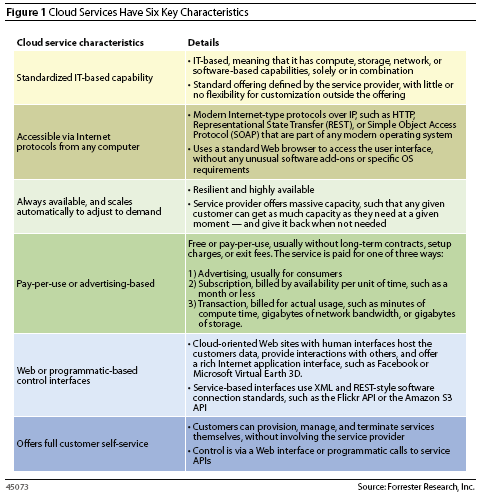Cloud computing as a term: More meaningless by the minute

The term cloud computing may have outrun its usefulness--it's beginning to conjure up images of "Web 2.0" and "paradigm shift."
For the record, cloud computing refers to an all-encompassing hosting of applications, services and even hardware. You'll just put your stuff up there in some cloud and it's always there for you. Sounds quaint huh? But cloud computing (all BTL posts) is more complicated than that. Now there are cloud breakdowns. Clouds within clouds. The prognosis for all of this mumbo jumbo is decidedly cloudy.
Consider this recent report from Forrester. Forrester analyst Frank Gillett notes:
Strategists at product and service purveyors, big and small, are pondering the right paths to take as a variety of Web and Internet “cloud” technologies and cloud services offerings envelop the market. Three myths are fogging up the options: 1) Cloud service offerings are one large market; 2) cloud equates to virtualization; and 3) cloud providers will compete primarily on price. How should IT vendor strategists sell to or compete with emerging cloud service providers? We cut through the mist to segment the offerings into five cloud services markets. Two of these markets, Web-based services such as Google and software-as-a-service offerings such as salesforce.com, are known markets delivered from the cloud. These combine with three new cloud-infrastructure-as-a-service markets: 1) app-components-as-a-service, 2) software-platform-as-a-service, and 3) virtual-infrastructure-as-a-service. To capture these new cloud service providers as customers, IT vendor strategists must create new business units, evolve existing offerings, and evaluate when to act as a supplier — and when to compete.
Got all that? Me neither. The gist: Cloud computing as a term has become so splintered it's useless. Everyone is in the cloud. Someone please get me rewrite.
Perhaps a few graphics will sort things out. Forrester identifies the key characteristics of so-called cloud services (I'll pin this up when I get a cloud computing pitch in about a minute or two):
And here are some examples:
Bottom line: Everyone (and their mother) is in the cloud--so that's why Dell was trying to trademark the term. It's quite possible Dell could have made more money with a cloud computing trademark than it does with PCs. In fact, Dell's temporary cloud insanity may have just marked the top of the cloud computing term. It appears the shelf life for the word "cloud" is about to end.
